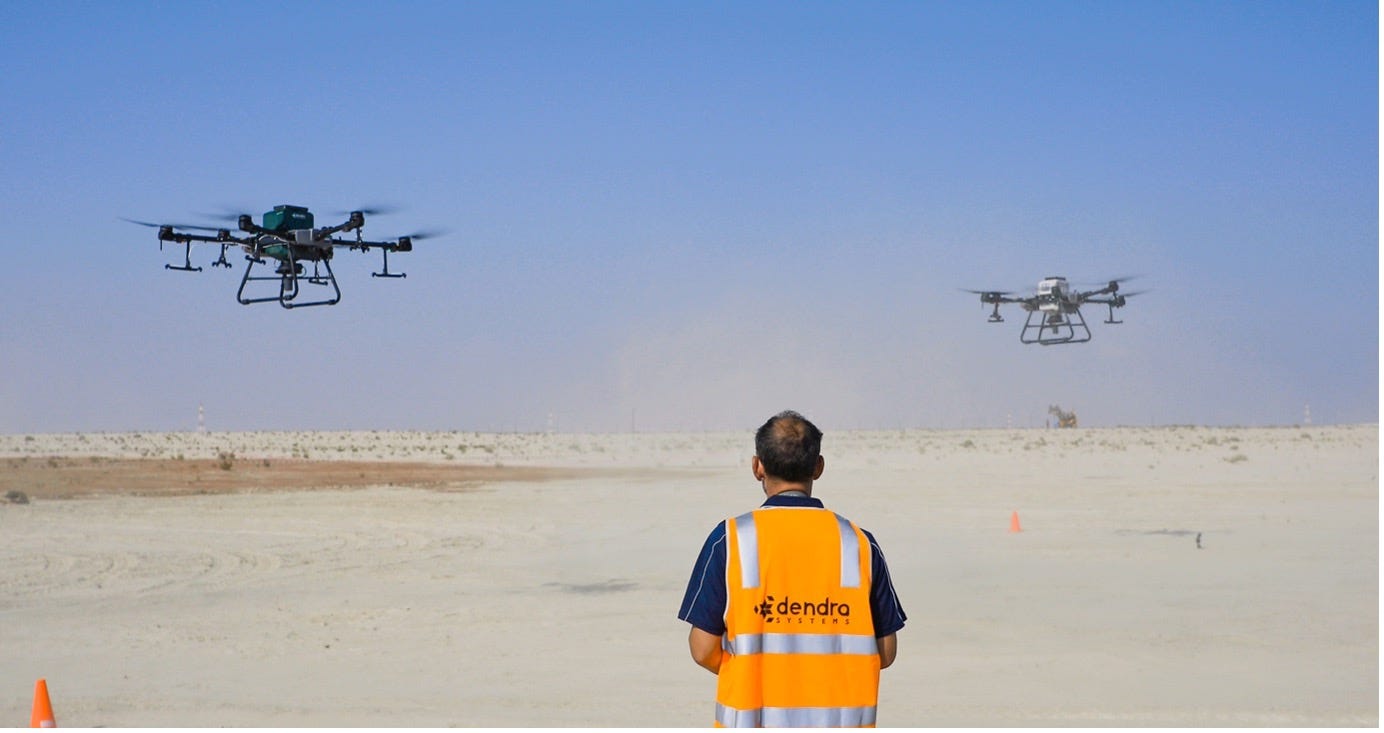Interview with CEO of Dendra: Dr. Susan Graham
In the ever-evolving ClimateTech landscape, ecosystem restoration stands as a frontier of immense promise and opportunity. Ecosystems, whether they may be mangrove forests, coral reefs, or dense rainforests, form the lifeblood of our planet sustaining biodiversity, regulating climate and providing sustenance to millions of species, including our own. Recognizing the pressing need for a more concerted effort, we sit down with Dendra Systems to learn more about the critical role that technology plays in restoring ecosystems at scale.
We are proud to be part of Dendra System’s journey since 2017. The team recently expanded its operations to the GCC, signing a ground-breaking partnership with the Environmental Agency Abu Dhabi to lead ecosystem restoration in the UAE supporting Abu Dhabi’s Climate Change Strategy.
1/ Whenever we explain what Dendra Systems does as a company, many people realise two things: first, how technology can actually work with physical ecosystems and two, the immensity of that opportunity. Can you give a brief overview on the company and your products?
Today, humans have degraded over 2 billion hectares of land, which is 2 times the size of Europe. Unfortunately, the rate of degradation continues to exceed the rate of repair. Dendra was founded with the aim of addressing this imbalance and restoring our planet for a more resilient future.
We are an environmental technology company that is setting the standard for biodiverse ecosystem restoration. We combine ecology expertise with remote high-resolution imagery collection that is analysed using AI-enabled data platforms.
Unlike traditional restoration approaches that rely on on-the-ground that sample less than 1% of an area, we survey 100% of the area to enable better decision making. Our aerial seeding and management tools enable our customers to achieve world-class restoration outcomes, whilst also address increasing biodiversity and carbon measurement needs.
Ecosystem restoration is a complex, multi-year undertaking, and we have developed a unique end-to-end approach called RestorationOS that significantly improves the success of our customers restoration programs.
Our successful restorations across deserts, tropical forests, and coastal ecosystems have made us the platform of choice for environmental managers, planning and leading multi-year government, infrastructure, and mining sector restoration programs.
2/ Your current footprint includes Australia, the UK and you are now opening a new office in Abu Dhabi, establishing your presence in the wider Middle East region. How are you looking at the Middle East and what makes it interesting?
We believe that Abu Dhabi and the MENA region present a massive opportunity to lead the world in restoration tech. Governments across the region have committed to transforming their economies by focusing on environment, carbon sequestration and biodiversity. There are several other factors that make the MENA region an ideal location for ecosystem restoration technology:
Degraded Land: The MENA region has a significant portion of degraded land due to desertification, land degradation, and climate change. According to the World Bank, studies on land degradation in MENA over the past two decades reveal overall land degradation of 40 percent to 70 percent, presenting a vast opportunity for ecosystem restoration technology to restore these lands.
Biodiversity: The region is home to a rich diversity of plant and animal species, many of which are found nowhere else. Restoring ecosystems can help protect and conserve this biodiversity.
Water Scarcity: Water scarcity is a significant challenge in the region. Our technology can focus on optimizing outcomes while using water efficiency. This means restoring degraded lands without putting additional strain on already scarce water resources.
Increased effort towards Sustainability: Governments and businesses are investing in technologies that promote sustainability. Ecosystem restoration technology fits into this trend and is likely to receive support from governments and businesses looking to invest in sustainable technologies.
Economic Benefits: Restoring degraded lands can provide significant economic benefits, such as increased agricultural productivity, improved soil quality, and increased carbon sequestration. This can provide an economic incentive for governments and businesses to invest in ecosystem restoration technology.
At Dendra, we believe these factors are the key ingredients that will enable us to drive ecosystem restoration to the next level. With passion, expertise and funding we can make a difference to the natural world. We’re excited to continue delivering on our mission in Abu Dhabi together and to partner with passionate local experts.
3/ The tech ecosystem in MENA is still early relative to other regions, particularly for traditionally underfunded sectors such as ClimateTech. How do you see the company in the region?
Yes, it is true that the technology ecosystem in the MENA region is still nascent, especially in areas such as ClimateTech. While there has been major progress towards investment in technology start-ups in recent years, MENA lags behind regions such as North America and Europe in terms of the size and maturity of its start-up ecosystem.
One reason for this is that historically there has been more emphasis on investing in traditional industries such as oil and gas, construction, and real estate and other sectors such as ClimateTech have been underfunded. However, there’s a growing awareness of the need to diversify the economy and invest in emerging sectors, including technology and renewable energy.
Despite these challenges, we believe there are positive signs of growth in the ClimateTech sector in MENA. Governments are ramping up their investment in renewable energy, and there are a growing number of start-ups and accelerators focused on sustainability and climate-related solutions. While there’s still a way to go to catch up with more mature ecosystems in other parts of the world, there’s potential for MENA to become a leader in ecosystem restoration technology.
As an ecosystem restoration innovator, we see all the ingredients in MENA to create a platform that empowers nature’s restoration on a global scale and to develop a world-leading business.






